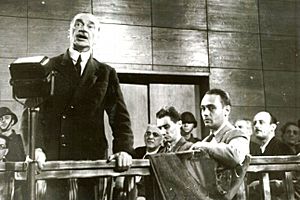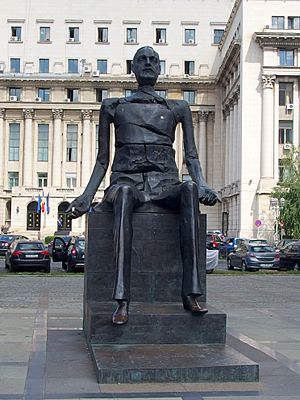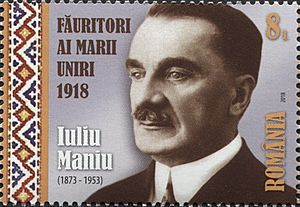Iuliu Maniu facts for kids
Quick facts for kids
Iuliu Maniu
|
|
|---|---|
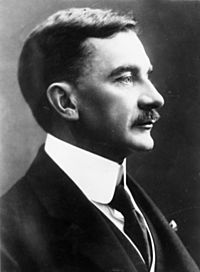 |
|
| 32nd Prime Minister of Romania | |
| In office 10 November 1928 – 6 June 1930 |
|
| Monarch | Michael I |
| Preceded by | Vintilă Brătianu |
| Succeeded by | Gheorghe Mironescu |
| In office 13 June 1930 – 9 October 1930 |
|
| Monarch | Carol II |
| Preceded by | Gheorghe Mironescu |
| Succeeded by | Gheorghe Mironescu |
| In office 20 October 1932 – 13 January 1933 |
|
| Monarch | Carol II |
| Preceded by | Alexandru Vaida-Voevod |
| Succeeded by | Alexandru Vaida-Voevod |
| Leader of the National Peasants' Party | |
| In office 10 October 1926 – June 1931 |
|
| Preceded by | Himself (as leader of the Romanian National Party) Ion Mihalache (as leader of the Peasants' Party) |
| Succeeded by | Ion Mihalache |
| In office July 1932 – January 1933 |
|
| Preceded by | Ion Mihalache |
| Succeeded by | Alexandru Vaida-Voevod |
| In office December 1937 – July 1947 |
|
| Preceded by | Ion Mihalache |
| Succeeded by | None (Party dissolved) |
| President of the Romanian National Party | |
| In office 23 February 1919 – 10 October 1926 |
|
| Preceded by | Gheorghe Pop de Băsești |
| Succeeded by | Himself (party merged into the National Peasants' Party) |
| Personal details | |
| Born | January 8, 1873 Szilágybadacsony, Austria-Hungary (now Bădăcin, part of Pericei, Sălaj County, Romania) |
| Died | February 5, 1953 (aged 80) Sighet Prison, Romanian People's Republic |
| Nationality | Romanian |
| Political party | Romanian National Party (1890–1926) National Peasants' Party (1926–1947) |
| Alma mater | Franz Joseph University University of Budapest University of Vienna |
| Profession | Lawyer |
| Religion | Greek-Catholic |
| Signature | |
Iuliu Maniu (8 January 1873 – 5 February 1953) was a Romanian politician and lawyer. He was born in Austria-Hungary. Maniu led the Romanian National Party of Transylvania and Banat. He played a key role in uniting Transylvania with Romania after World War I.
Maniu served as Prime Minister of Romania three times between 1928 and 1933. He also helped create the National Peasants' Party. In 1947, he was arrested by the new communist government. He was accused of working against the country in an unfair trial. Maniu was sent to Sighet Prison, where he died six years later.
Contents
Early Life and Education
Iuliu Maniu was born into a Romanian family in Szilágybadacsony, which is now Bădăcin, Romania. His parents were Ioan and Clara Maniu. He finished school in Zalău in 1890.
He then studied law at universities in Kolozsvár (Cluj), Budapest, and Vienna. He earned his doctorate degree in 1896.
Maniu joined the Romanian National Party of Transylvania and Banat (PNR). He became a leader in the party in 1897. He also represented the party in the Budapest Parliament. He worked as a lawyer for the Greek Catholic Church in Blaj.
Maniu was an advisor to Archduke Franz Ferdinand. He helped the Archduke with ideas to change the Habsburg monarchy. After the Archduke was killed in 1914, Maniu started to support the idea of Transylvania joining the Romanian Old Kingdom.
Leading the National Party
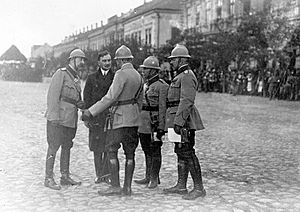
Maniu worked with other important figures like Vasile Goldiș and Alexandru Vaida-Voevod. They pushed for Transylvania to unite with Romania. This led to the Great National Assembly of Alba Iulia on December 1, 1918. During this meeting, Romanians officially asked to separate from Austria-Hungary.
On December 2, Maniu became the head of Transylvania's Directory Council. This was like being an interim governor.
In May 1919, during the Hungarian–Romanian War, Maniu visited Alba Iulia with King Ferdinand I and Queen Marie. They also met with soldiers at the front lines.
After Greater Romania was formed, the PNR created a government in Bucharest. This government was led by Al. Vaida-Voevod and worked with Ion Mihalache's Peasants' Party. They competed with the traditional National Liberal Party.
King Ferdinand I later dissolved Parliament. Maniu disagreed with the national leaders, especially after the new Prime Minister, Alexandru Averescu, dissolved the Transylvanian Council. Maniu refused to attend King Ferdinand's crowning as King of Greater Romania in 1922. He felt it tried to force multi-religious Transylvania to become Orthodox.
The PNR also did not like the centralization that the 1923 Constitution brought. They wanted any changes to the constitution to be approved by a special assembly. In 1926, the PNR and the Peasants' Party joined together. They formed the National Peasants' Party (PNȚ). Maniu was the president of this new party for many years.
The National Peasants' Party in Power
The PNȚ won many elections, but King Ferdinand often chose other leaders to be Prime Minister. Maniu protested this. He even tried to organize a large march of peasants to Bucharest to show public support.
Maniu also talked with Prince Carol, King Ferdinand's son. Carol had been removed from the line to the throne. Maniu suggested Carol return and become king in Alba Iulia. However, these talks stopped when British authorities were asked to make Carol leave their country.
The PNȚ first came to power in November 1928. This happened after both King Ferdinand and the National Liberal Party leader had died. In the elections that year, the PNȚ joined with the Romanian Social Democratic Party and the German Party.
In 1930, Maniu helped Carol return to Romania. Carol then became King Carol II, and his young son Michael was no longer king. However, King Carol did not keep his promises to Maniu. Maniu's government faced a strike by coal miners in 1929. They also dealt with big economic problems from the Great Depression in Romania. Maniu resigned for the last time on January 13, 1933, because of his disagreements with King Carol.
During Dictatorships
Romania then moved towards an authoritarian government led by King Carol. This happened as the fascist Iron Guard grew quickly. In 1937, Maniu made an agreement with the Iron Guard's leader, Corneliu Zelea Codreanu. He hoped this would stop the King's plans. Instead, the King made deals with other politicians and cracked down on the Iron Guard.
In 1940, Romania lost several territories. King Carol gave up power and went into exile. This led to the creation of the National Legionary State, led by the Iron Guard and General Ion Antonescu. This new government sided with Nazi Germany in World War II.
The PNȚ continued to exist secretly. After Antonescu removed the Iron Guard from power, Maniu began talking with the general. He asked for an end to the persecution of Jews and their forced movement to Transnistria. Maniu remained against Antonescu. He also disliked the Soviet Union. He joined the secret plan for the pro-Allied royal coup on August 23, 1944. He did not like that the Romanian Communist Party was involved in this plan.
Against Communism
After the war, Maniu strongly supported the Western Bloc countries. He was a main opponent of the growing Soviet influence in Romania. His party became the main target of the Communist Party. In February 1945, supporters of the PNȚ and Communists had street fights.
The PNȚ came in second place in the November 1946 general election. They won 33 seats, far behind the Communist-controlled Bloc of Democratic Parties. Some people later claimed that the PNȚ actually won the election. They said the Communists cheated to win. A historian later reviewed a secret Communist Party report. This report showed that the Communist-led group did not win a majority. The historian concluded that if the election had been fair, the PNȚ and other opposition parties could have formed a government.
After 1946, the PNȚ was pushed aside. The Communist Party worked with some former PNȚ members.
In a message to the US government, the US representative in Romania, Burton Y. Berry, wrote about Maniu. He said Maniu had bravely supported pro-Allied actions in Romania. He also said Maniu had a huge number of followers and was respected by all Romanians.
The party was made illegal in July 1947. That month, Ion Mihalache tried to leave the country by plane. The plane landed at Tămădău. This was seen as an act of working against the country. Both Maniu and Mihalache faced an unfair trial. In November 1947, they were sentenced to life imprisonment with hard labor. Because they were old, this was like a death sentence. This trial marked the start of the government stopping all opposition groups in Romania.
Death and Legacy
Iuliu Maniu died in 1953 in Sighet Prison. His body was buried in a common grave in the prison courtyard. His official death certificate said he was "unemployed." It listed his cause of death as heart failure.
On November 12, 1998, a high court in Romania cleared Maniu's name. They also removed the order to take away his property from 1947.
A statue of Maniu is in Bucharest's Revolution Square. It is in front of the building where the Communist Party used to be. The statue was put there on December 1, 1998. This was 80 years after the Great Union Day. There are also statues of Maniu in other Romanian cities.
One of the main roads in Bucharest is called Iuliu Maniu Boulevard. It is about 6.8 kilometers (4.2 miles) long. Many other streets and boulevards in Romania are named after him. High schools in Bucharest, Carei, Oradea, and Șimleu Silvaniei also carry his name.
Maniu has appeared on two postage stamps from Romania. One was in 1993 and the other in 2018. Both stamps celebrated Great Union Day.
Images for kids
See also
 In Spanish: Iuliu Maniu para niños
In Spanish: Iuliu Maniu para niños
 | Bayard Rustin |
 | Jeannette Carter |
 | Jeremiah A. Brown |


